“I cannot live the rest of my life without my husband. But I can live without him for one day.” This quote from Linda Feinberg’s book I’m Grieving as Fast as I Can perhaps sums up what rebuilding your life after the death of a spouse can look like. Yes, death is hard, and especially hard if the person you’ve lost is a partner of many years. But are you wondering how to rebuild your life after death of spouse? Or how to get closure when someone dies unexpectedly? Or if a person can actually get over such a big shock so easily? How do widows cope with loneliness? Perhaps one needs to take recovery one step at a time.
In situations where the loss of a spouse occurs due to unforeseen events like car accidents or other incidents, individuals are not only grappling with deep emotional trauma but also practical and legal challenges. Accessing resources that provide both support for recovery and actionable guidance in pursuing claims or addressing liability—such as The bradley law firm can be invaluable during this time.
In this article, we’ll delve deeper into this issue and find out what makes grieving the death of a partner so hard and what the stages of grief look like. We’ll also offer a few ways to help you with moving on after death of spouse, with insights from psychiatrist Dr. Shefali Batra (MD in Psychiatry), who specializes in counseling for separation and divorce, breakup and dating, and premarital compatibility issues.
What Is The Hardest Part Of Losing A Spouse?
Table of Contents
Before coming to the hardest part of losing a spouse, let’s look at a study that talks about spousal bereavement in detail. It clearly says, “The death of a husband or wife is well recognized as an emotionally devastating event, being ranked on life event scales as the most stressful of all possible losses.”
Dr. Batra explains, “Your spouse is your one legitimate partner who sticks with you through the thick and thin of your life. A person’s entire conditioning to the care, attention, love, or even the complaints from a spouse is what keeps them going, and when that is lost, the emptiness or void can be terrifying. The first year after losing a spouse can be emotionally devastating. In fact, it can be worse than the immediate aftermath of death. It’s at that stage when you may find yourself uttering, “I miss my deceased husband” quite often.”
Related Reading: What I Regret After The Death Of My Spouse
While there is no one single reason that makes this loss ‘the hardest’, some of the factors that may be considered the hardest part of losing a spouse are:
- It marks the end of your relationship, and if it was a good one, you lose a lifelong friend, a cheerleader, a sexual partner, and a support system
- It doesn’t end the bond, and you can’t focus on new memories or new relationships because you’re still connected to old memories
- It makes you feel abandoned or betrayed by your spouse. It’s as if they left you to deal with life’s challenges on your own
- You end up with no social life. Dinners, weekends, and important life events are the hardest for some, as they keep reminding them of the togetherness and good moments of the past
- Living in the same house after the death of your spouse can cause emotional pain, as every object may remind you of your partner
How Does The Death Of A Spouse Affect A Person?
Now that we know how hard it is for someone to lose a partner, you may be asking, “How does the death of a spouse affect a person?” It’s like losing a best friend, a safe space, or a partner in crime. When you lose the most important person in your life, it damages you irreparably, even if you’re the most independent person in the world or needed a lot of personal space in the relationship when your spouse was still around. In fact, a study explored that such a loss can lead to “emotional and practical problems” in older adults.
So, how long does grief last after death of spouse? Well, it can last for years and can have a long-term impact, at times devastating. In fact, a study stated how spousal bereavement “…has immediate and longer-term consequences for many aspects of the surviving spouse’s life, including their health and well-being, their personal relationships, how they spend their time, and their sense of self.”
Related Reading: 21 Tips For Dating A Widower
Dr. Batra agrees, “The death of a husband, or a wife, is recognized as the most difficult time of one’s life. In fact, the first year after losing a spouse can be soul-crushing. It affects a partner extremely deeply because a spouse is like a co-manager. Even if your spouse is not sitting with you 24/7, they are the co-manager of your house, children, family, friends, and members of social units, such as organizations, or societies or groups.” For instance, your spouse is your designated “plus one” at all social events.
Stages of grief
While discussing how to rebuild your life after death of spouse, Dr. Batra also touched upon the stages of grief. Apparently, there are 5 stages, with the last stage being acceptance. It’s important to note that the progress is not always sequential, but it almost always leads to the final stage, acceptance. So, let’s take a look at the 5 stages of grief that a person goes through after any loss, especially that of a spouse.
- Denial: This is the first stage of grief, where one just doesn’t believe that their partner is actually gone. When this is taken to an extreme end, you may become delusional and believe that the partner is alive or that medical professionals have made a mistake by declaring them dead. Dr. Batra says, “We don’t call this an absolute delusion because many people feel this way and it passes with time. It’s a state of shock which they are not able to accommodate.”
- Anger: The second stage of the grieving process is anger, where you feel that your spouse was wrongfully taken away from you. You feel it was too soon for them to go and that it was unfair. At this stage, you may lash out at your family and friends or even direct your anger toward yourself, by shutting yourself in
Related Reading: 11 Expert Tips To Have A Successful Second Marriage
- Bargaining: This is a stage of ‘what ifs’. This is when you have a hard time accepting the reality and start wondering what you could’ve done differently to avoid the loss. Dr. Batra explains, “This is when grieving people start going back in time and wondering if only their spouse could’ve lived a little longer.” If the death of a spouse involved circumstances such as an accident or negligence, you may be facing complex questions about your rights and next steps. In these cases, it may be beneficial to consult professionals for legal counsel regarding potential personal injury or wrongful death claims, which can help address practical issues while you focus on emotional recovery.
- Depression: In this stage, you have to deal with depression, and lots of it at once. This is when reality begins to set in and you begin to acknowledge the loss. This is when it hits you that your partner is not there any longer, especially when you’re living in the same house after the death of your spouse. Dr. Batra says, “This stage makes them really sad, low, and empty, and the hollowness in them becomes more evident. This is when they feel numb.”
- Acceptance: Much after the depression phase of the grieving process has passed, begins the stage of acceptance. In this stage, one comes to terms with the loss. Wondering how to get closure when someone dies unexpectedly? Well, Dr. Batra says, “During this last stage, you may perhaps start learning new coping skills. This is when you make new connections and begin to pick up the pieces of life again.”

Symptoms of grief
Besides the stages of grief, we’ll look at some deep effects of spousal death too. Interestingly, widowhood effect, the other term for “dying of a broken heart”, is a phenomenon wherein the likelihood of a person dying shortly after the death of a spouse increases. The death could be due to suicide or natural causes due to health issues, stress, and depression. And this direct impact of grief after a spouse’s death can be prevented if we watch out for the symptoms of grief.
Related Reading: 11 Easy And Effective Tips To Survive Heartbreak Without Breaking Yourself
Let’s look at a few such symptoms. We’ll broadly divide the symptoms in two parts, psychological and physical symptoms:
Psychological symptoms
Psychological symptoms
- Survivor’s guilt: This is when your spouse dies in a natural calamity or an accident which you may have survived. It’s part of post-traumatic stress disorder (PTSD) and comes from a feeling of not having done enough to save a spouse
- Anhedonia: This is a strange phenomenon wherein you will not find joy in the things you once enjoyed. So, your favorite pastime, be it gardening or reading, will not make you happy any longer
- Anxiety and depression: Grief after the death of a spouse can bring about severe mental health issues, such as major encounters with depression and anxiety. While anxiety can be located by looking out for increased heartbeat, sweating, restlessness, and worrying excessively, depression can be pin-pointed by watching out for lack of concentration, suicidal thoughts, and lethargy
Physical symptoms
- Brain fog: This can be a collection of various symptoms, including failure to focus and loss of memory
- Insomnia: One of the sure-shot symptoms of grief is a marked change in sleep patterns. You may find yourself staying awake till the wee hours of the morning, thinking about your lost loved one
- Digestive issues: Disrupted eating habits during grief can cause severe digestive issues, such as constipation, diarrhea, and stomach pain, accompanied by nausea or queasiness
- Weight issues: A lack of focus on a balanced diet may cause rapid weight loss or gain
- Decreased immunity: Lack of sleep and a proper diet can result in reduced immunity, bringing in a host of diseases
Related Reading: The Emotion Wheel: What It Is And How To Use It To Build Better Relationships
11 Expert-Backed Tips On How To Rebuild Your Life After The Death Of A Spouse
Mourning a death and getting back to normal life after such a loss isn’t a linear process. And how long does grief last after death of spouse? Well, it can take anywhere from a few weeks to a few months to years to recover. Likewise, there’s no right or wrong way to heal. At times, the healing is interrupted by the self — the thoughts and memories of one’s spouse, the good times shared, and the longing to be with them once more. But more often than not, the friends and family of a person make them feel guilty for moving on so quickly. They start judging their love and loyalty for their dead spouse.
A Reddit user thinks on the same lines and has likened remarrying after the death of a spouse to cheating in a relationship. The user further goes on to say: “I mean death is not divorce. It’s just unintended physical separation, like being abducted and forced to go on a very long trip in a far away country with the possibility of never seeing each other again.
Related Reading: 17 Death and Love quotes to Ease Your Pain
“I don’t consider myself religious but if there’s a life after this by any chance and a reunion happens and you live forever with the loved ones you lost in life, who’s going to be your spouse now? You will have to let go of one of them after having so many precious and special memories together? Is there space for two loves in one heart?”
But rebuilding your life after the death of a partner is important, as life goes on and one can’t rely on memories alone to get you through the practicalities of day-to-day life. In this section, Dr. Batra helps us unearth a few ways to get back to normal life after the death of a spouse. So, here it goes:
1. Remember you are alive
In case you’ve lost a spouse, a crucial step to recovery is to realize that you are still living. You matter and so do your thoughts, desires, and aspirations. So, continue living. Dr. Batra says, “Remember that your life can and should be as full as it was before your partner’s death because you still have you. The right mindset is what will drive you ahead.”
2. Don’t quit the things you enjoyed together
Wondering “How to deal with grief of losing a spouse?” Instead of quitting the things that you love to engage in, continue spending time doing them, either with friends or solo.
So, be it traveling to exotic locations, trying a variety of culinary delicacies, or just decorating your home, if something brought you two joy, don’t quit it just because you’ve lost your partner. Dr. Batra adds, “A sunset does not become less beautiful because you do not have a spouse to see it with. so, instead of letting the grief and loss destroy you, try and focus on rebuilding your life.”
A coworker, Trish, lost her husband, Ryan, to a car accident, in her late 40s. Ryan and Trish would often backpack to the mountains when he was alive. After repeatedly crying “My husband died and I want him back” for the initial few weeks, Trish joined a backpacking club and went off to the mountains again. It made her feel whole and come to terms with the grief, she said.
Related Reading: First Relationship After Being Widowed – 18 Dos And Don’ts
3. Rediscover yourself
If you’re still wondering how to rebuild your life after death of spouse, well, the lull after you’ve lost your spouse and have come to terms with it is the right time to rediscover yourself. Make a checklist of all the things you’ve always wanted to do and didn’t get the time to, or had out on the back burner because of your mundane domestic responsibilities. So, give your household chores a break and focus on your dreams.
Dr. Batra says, “After all you matter too right? If you don’t love yourself, then who else will?” So, always wanted to take that solo trip to Europe? Or hit the gym and lose a few pounds? Do it right away!
4. Practice gratitude
It’s important to be thankful for life and the beautiful things it offers us. And for being alive in the first place. So, practice gratitude for living to see another day and breathe in the mourning period for spouse itself. Dr. Batra says, “Be thankful for all the wonderful things that you still have in life, such as your family and friends, your job, and your home. Cherish all the people around you who are still alive, all the people who love you, and the people you love.”
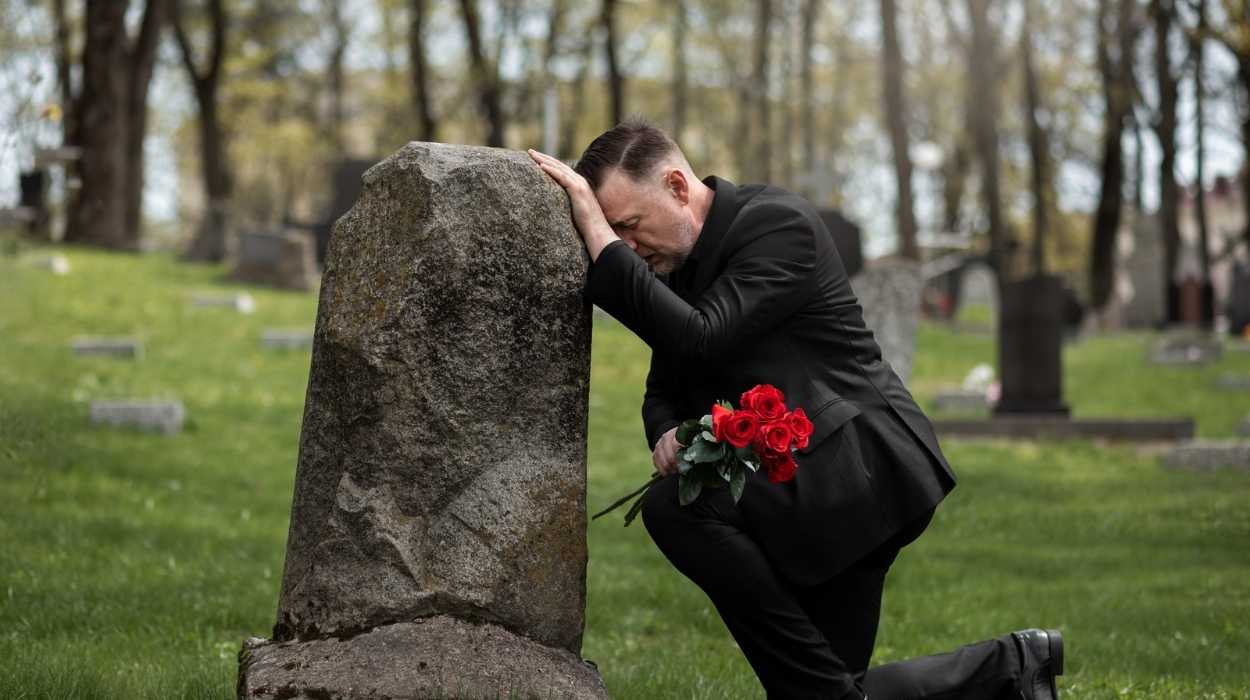
5. Learn a new skill
Bringing in new experiences in life makes you cope with the loss of a spouse effectively, at times. So, learn a new skill, such as sketching, pottery, or dancing. Dr. Batra feels, “This will activate fresh neurons in your brain, and will also release dopamine, which will help you find happiness again.” A friend of mine, Alice, was devastated when her husband passed away in his early 30s. She could say nothing apart from “My husband died and I want him back” for a few weeks. She started learning French soon after the initial shock, as she had always wanted to learn a new language but never had the time to.
Eventually, she took a trip to France, and using her newly earned linguistic skills, she took up a volunteer teaching assignment there, while touring the country for a month. She still tells me how fulfilling the whole experience was for her. It was her window to a new life.” This is perhaps how to rebuild your life after death of spouse.
6. Engage in charity
The mourning period for spouse may not be fixed but while you’re trying to get back to the grind of daily life after the initial shock, you may want to do a good deed or two. So, while you’re still mourning the loss of a husband or wife, donating to charitable causes is a great idea! It’s perhaps the best way to deal with the state of limbo that losing a partner throws you in. It also has a feel-good factor, and you end up making someone else’s life better.
Related Reading: 11 Dating Sites And Apps For Widows – 2022 Updated
Dr. Batra says, “If you have the funds, you can share that. If you have the time, then you must share that. If you have love and care, and some skill that can benefit someone else, then share that most definitely. When we give, we gain a lot more, and this is the perfect time to engage in charity.”
7. Reach out to your childhood friends
Still wondering how to rebuild your life after death of spouse? Has mourning the loss of a husband or wife messed with your normal routine completely? Call up that friend you haven’t been in touch with for 10 years and who used to be your best buddy in school. Meet that long-lost friend from your old neighborhood who used to accompany you to the dance class every day. Spending time with friends and getting in touch with people who remind you of your happy past bring back your sense of identity and makes getting back to daily life after the loss of a partner easier.
Dr. Batra feels, “Childhood friends are the ones who knew you when you were little and single. They are the ones who accepted you through thick and thin. They’re the ones who were always there, and you felt complete in their company because you were stress-free and independent. Try teleporting yourself back to that time.”
8. Keep the memories alive
So, losing a spouse unexpectedly also means you will no longer be celebrating anniversaries, relationship milestones, or birthdays with them. But hey, who said you need to be sad on those special days? Continue celebrating them. And we’re not asking you to dramatically throw a party. Go, buy that strawberry-flavored cake your partner loved, and have it while watching his favorite movie at home.
Related Reading: How To Deal With Mementos Of A Lost Love
Dr. Batra says, “You should be happy reminiscing about the good times that you had with your partner. Just because you lose a person doesn’t mean you lose the goodness that you once shared with them. This is a way to honor the life that you and your spouse shared. The best gift you can give them is a life-long place in your heart.”
9. Don’t judge yourself
It’s important to be at ease with your emotions when you’re wondering what to do when a spouse dies or how to rebuild your life after death of spouse and trying to manage grief. So, don’t judge yourself for the way you feel.
Dr. Batra says, “Some days you might feel attracted to someone new and may think of starting a new relationship. Don’t think you’re a bad person for that. Some days you’ll keep crying and missing them. Don’t judge yourself or think that you’re weak. Feel free to feel the way you feel. Of course, all of this is fine within the limits of taking care of yourself and not getting into extremes.” After all, there’s no concrete answer to “how long does it take to grieve a spouse?”
10. Love yourself unconditionally
Love yourself: your talents, your physical and mental health, your work ethics, your love for your family members and friends – value every single thing that makes you ‘you’. Invest in self-care activities, such as a spa day, an exercise class, or a haircut. Dedicate an entire day to pampering yourself.
Dr. Batra says, “Understand that it’s hard work to process grief and that you are on the job. You didn’t ask for it, but you still have to deal with separation, as it is an essential part of moving on after spouse dies. Feel the mixture of your complex emotions, even if they are as negative as confusion, disorientation, fear, guilt, or anger.”
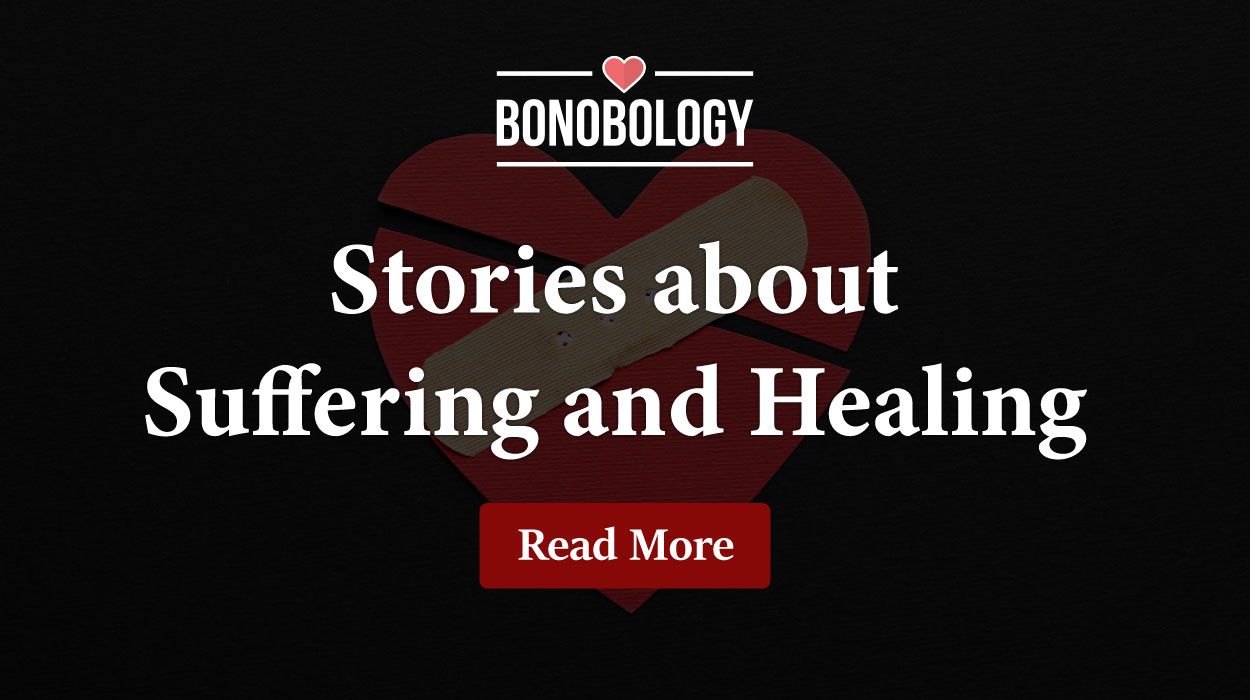
11. Seek professional help
Still wondering what to do when a spouse dies? Well, the best bet, perhaps, is to opt for grief counseling or join support groups where you can share stories with like-minded people. Dr. Batra opines, “I say this not just for people who are experiencing pathological grief or who are suffering from delusions or extreme depression, sadness, or suicidal tendencies. You need to understand the importance of your mental health. You need to understand that you need care and love while trying to cope with such a big loss.” If you’re considering seeking help, Bonobology’s counseling service can offer you the unbiased guidance you need to work through your grief.
Key Pointers
- The hardest part of losing a spouse is perhaps the feeling of abandonment one feels, along with the loss of a lifelong friend
- People usually go through the 5 stages of grief during spousal bereavement: denial, anger, bargaining, depression, and acceptance
- Some ways to get back to normal life after grieving a spouse are: loving yourself, getting in touch with childhood friends, learning new skills, and seek grief counseling
We hope you now have some clarity on how to deal with grief of losing a spouse. And you’re still not wondering how to rebuild your life after death of spouse. Mourning a death, and that too of your spouse, may feel overwhelming. But at the end of the day, you only have yourself. You matter and so do your loved ones who are perhaps cheering on as they wait for you to get over the troubled times. So, don’t disappoint them or yourself.
How long does it take to grieve a spouse? Well, people heal at their own pace, and it won’t happen overnight. It could also take you a few years if you’re living in the same house after the death of your spouse. But remember, the way forward is the only way. At times, you can be your only savior by coming to terms with the loss and inching your way to a new chapter and new memories.
FAQs
Some experts call the immediate stage after losing a spouse unexpectedly ‘widow brain’. It’s when the shock of losing a spouse affects the brain of the person and they are left disoriented, forgetful, and in a state of ‘mental fog’. They are still coming to terms with grieving a spouse.
There’s a theory that a person’s chances of dying increase sharply after their spouse’s death. It is known as the ‘widowhood effect’ or the ‘broken heart syndrome’. Many such deaths are caused by stress and its impact on the immune system. Many others die of suicide, driven by loneliness. And how do widowers cope with loneliness? Well, much in the same way that widows do. So, it’s not a gender issue.
Your contribution does not constitute a charitable donation. It will allow Bonobology to continue bringing you new and up-to-date information in our pursuit of helping anyone in the world to learn how to do anything.



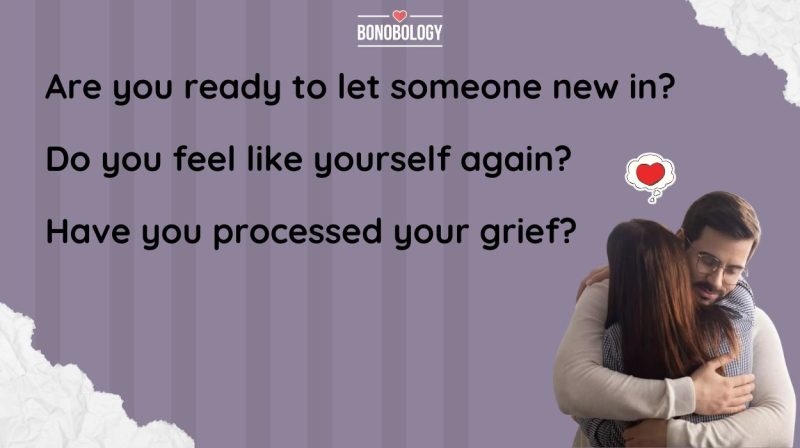
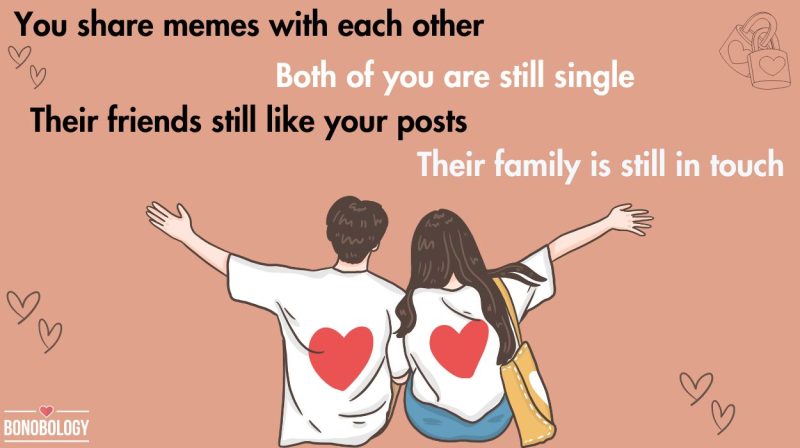













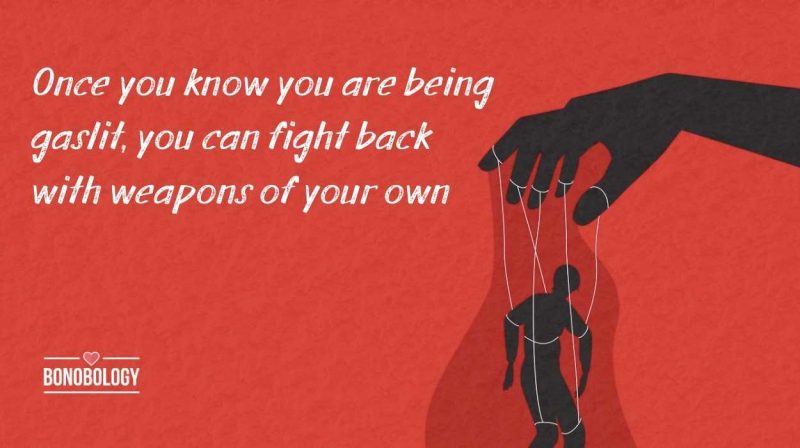



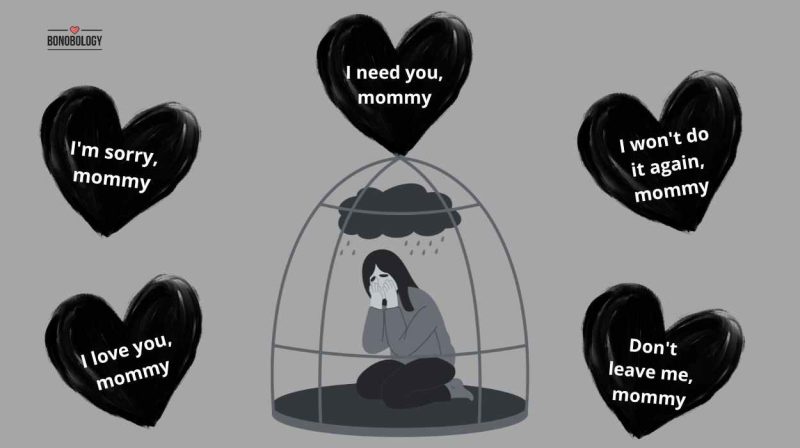
Featured
Am I Moving On Too Quickly After Death Of Spouse—How To Decide
15 Signs You’ll Get Back Together With Your Ex
How To Get Over Trust Issues — A Therapist Shares 9 Tips
Learn How To Forgive Yourself For Hurting Someone You Love
How To Find Peace After Being Cheated On — 9 Tips From A Therapist
How To Forgive A Cheating Husband: 15 Helpful Tips
35 Disturbing Signs Of Gaslighting In A Relationship
What Is Narcissistic Ghosting And How To Respond To It
‘My Husband Starts Fights And Then Blames Me’: Ways To Cope
My Husband Died And I Want Him Back: Coping With Grief
“Am I Unlovable” – 9 Reasons You Feel This Way
11 Signs Your Girlfriend Was Sexually Abused In The Past And How To Help Her
Coping With Breakups: The Must-Have Breakup Apps For Your Phone
15 Signs You Are Wasting Your Time Trying To Get Your Ex Back
Why Are You Obsessed With Someone You Barely Know — 10 Possible Reasons
33 Phrases To Shut Down Gaslighting And Silence Gaslighters
The Emotion Wheel: What It Is And How To Use It To Build Better Relationships
The Role Of Supportive Relationships In Addiction Recovery
7 Signs You Have A Verbally Abusive Wife And 6 Things You Can Do About It
Mommy Issues In Women – Meaning, Psychology, And Signs